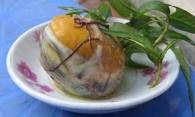Children should not eat balut eggs.
Balut is very nutritious but not suitable for children under 9 years old because children cannot absorb all the nutrients, which can easily lead to bloating and indigestion.
 |
According to the National Institute of Nutrition, 100g of balut eggs contain 182 kcal of energy, 13.6g of protein, 12.4g of fat, 600mg of cholesterol, 82mg of calcium, 212mg of phosphorus, 3mg of iron, 450mcg of beta-carotene, 875mcg of vitamin A...
Doctor Le Thi Hai, National Institute of Nutrition advises: "Balut is good but children should not eat too much because it contains too many nutrients, children cannot absorb all of it and can easily get bloating and indigestion."
According to physician Vu Quoc Trung, the process of developing from an egg into a balut egg produces many substances that are beneficial to the body, such as proteins metabolized in the form of amino acids, and fats metabolized in the form of easily absorbed fatty acids, enhancing nutrition. However, children's ability to digest and metabolize is not the same as adults, so they should not be fed.
"From the age of 9, children can eat balut eggs," said physician Trung. Adults can eat 1-2 balut eggs a day, but note that eggs contain a lot of cholesterol. People with high blood fat should not eat too much.
According to Dr. Hai, it is best for children to eat boiled eggs or eggs beaten into porridge. Eggs are essential for the development of young children, so previously nutrition was divided into 4 food groups, now it is divided into 8 groups. In the protein group, milk, beans and eggs are divided into 3 groups. "Previously, eggs and milk were classified in the protein group, so it can be understood that if children do not eat eggs or drink milk, they can still eat a lot of meat. Now the egg group is separated, so it is an indispensable ingredient," said Dr. Hai.
Normally, a chicken egg weighs about 40g (with shell), without the shell, 100g of chicken eggs is equivalent to 3 eggs. 100mg of chicken eggs provides 166 kcal of energy, 14.8g of protein, 11.6g of fat. Eggs are one of the foods that provide a lot of protein with high biological value, easy to absorb (the protein absorption rate of eggs is 100%). In addition, egg yolks provide a lot of fat, vitamins and minerals that are essential for children's development such as iron, vitamin A, zinc...
Children 6-7 months old: Should only eat half an egg yolk per meal, 2-3 times per week.
Children 8-12 months old: Eat one egg yolk per meal, eat 3-4 egg meals a week.
Children 1-2 years old: Eat 3-4 eggs per week, both whites and yolks.
Children 2 years and older who like eggs can eat one egg per day.
According to Zing.vn


